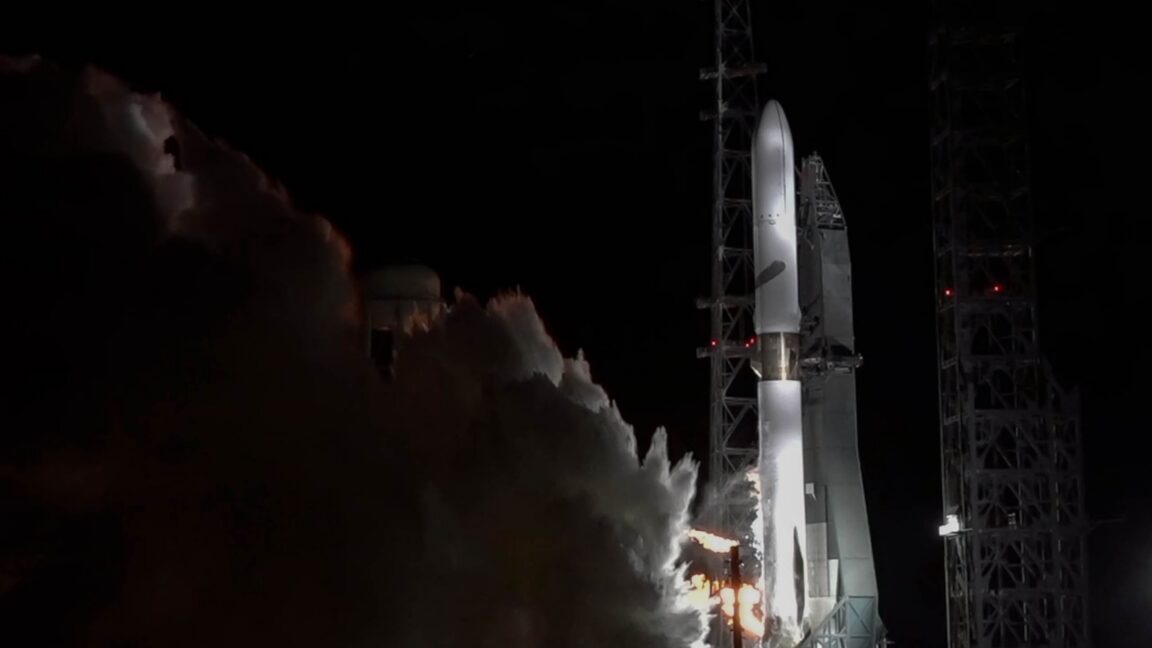Blue Origin’s New Glenn Rocket Test-Firing Sparks Controversy: A Race to the Stars or a Misguided Space Race?
The road to the second flight of Blue Origin’s heavy-lifting New Glenn rocket has become a focal point of both excitement and criticism, particularly after the recent successful test-firing of its seven main engines. This event took place at Cape Canaveral Space Force Station in Florida, a site steeped in the history of American space exploration, yet now also a backdrop for discussions about the implications of the private space race.
On Thursday night, at precisely 9:59 PM EDT, the New Glenn rocket ignited its BE-4 main engines, which burned for 38 seconds while the rocket remained securely on the ground. This successful hold-down firing is notable as it signifies the final major test before the rocket’s anticipated launch. The context of this test is crucial; with the rocket’s second-stage engines already having been test-fired, the focus now shifts to the overarching implications of Blue Origin’s advancements in space technology.
Blue Origin, founded by Amazon’s Jeff Bezos, positions itself as a competitor to SpaceX, Elon Musk’s visionary company that has already made significant strides in reusable rocket technology and has a strong foothold in commercial space travel. The competitive landscape raises questions about the motivations behind these companies. Are they genuinely pushing the boundaries of human exploration and technological innovation, or are they merely engaging in a modern-day space race fueled by ambition and commercial interest?
The current trajectory of Blue Origin’s New Glenn rocket development intersects with broader themes of nationalism, corporate power, and the ethics of space exploration. Critics argue that the privatization of space travel could lead to a monopolistic environment where a few wealthy individuals and their companies dominate access to outer space. This reflects wider societal concerns about wealth disparity and the ethical implications of allowing private entities to control resources beyond our planet.
Moreover, as the New Glenn prepares for its possible liftoff as soon as November 9, there is a growing discourse surrounding the environmental impact of rocket launches. While space tourism and exploration are often celebrated as milestones of human achievement, the carbon footprint and potential pollution resulting from increased rocket activity cannot be overlooked. The implications of launching rockets from Earth, especially when considering the cumulative effect of many launches, pose significant questions about sustainability and responsibility.
The New Glenn’s design aims to support a variety of missions, from launching satellites to carrying cargo and potentially humans into orbit. This versatility positions it as a significant player in the burgeoning space economy, but it also underscores the need for regulatory frameworks that ensure safety and environmental protection. The potential for increased commercial activity in space raises questions about how humanity will manage its presence beyond Earth, particularly in terms of space debris and orbital congestion.
As Blue Origin pushes forward, the stakes are high. The company’s ambitions are not just about reaching the stars but also about establishing a foothold in a market that could be worth trillions of dollars in the coming decades. The implications of this commercialization are profound, touching on issues of governance, ethics, and even the philosophical implications of space colonization.
In conclusion, the test-firing of the New Glenn rocket’s engines serves as a vivid reminder of the increasing role of private companies in space exploration. As Blue Origin prepares for its upcoming launch, the wider conversation about the future of space travel, the responsibilities of corporate entities, and the ethical dimensions of this new frontier continues to evolve. The sense of competition in the air is palpable, as is the urgency for society to grapple with the implications of this new era of space exploration and commercial activity. The excitement surrounding the New Glenn rocket is tempered by the critical need for a thoughtful approach to the challenges that lie ahead as humanity reaches for the stars.
The road to the second flight of Blue Origin’s heavy-lifting New Glenn rocket got a lot clearer Thursday night with a success test-firing of the launcher’s seven main engines on a launch pad at Cape Canaveral Space Force Station, Florida.
Standing on a seaside launch pad, the New Glenn rocket ignited its seven BE-4 main engines at 9:59 pm EDT Thursday (01:59 UTC Friday). The engines burned for 38 seconds while the rocket remained firmly on the ground, according to a social media post by Blue Origin.
The hold-down firing of the first stage engines was the final major test of the New Glenn rocket before launch day. Blue Origin previously test-fired the rocket’s second-stage engines. Officials have not announced a target launch date, but sources tell Ars the rocket could be ready for liftoff as soon as November 9.




